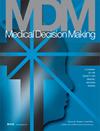Exploring Cultural and Religious Effects on HPV Vaccination Decision Making Using a Web-Based Decision Aid: A Quasi-experimental Study
IF 3.1
3区 医学
Q2 HEALTH CARE SCIENCES & SERVICES
引用次数: 0
Abstract
BackgroundHuman papillomavirus (HPV) poses a significant public health concern, as it is linked to various serious health conditions such as cancer and genital warts. Despite the vaccine’s safety, efficacy, and availability through national school programs, HPV vaccination rates remain low in Israel, particularly within the ultra-Orthodox community due to religious and cultural barriers. Decision aids have shown promise in facilitating shared decision making and promoting informed choices in health care. This study aimed to assess the impact of a novel Web-based decision aid on HPV vaccination intentions, knowledge, decision self-efficacy, and decisional conflict among Israeli parents and young adults, with a specific focus on exploring differences between religious groups.MethodsTwo Web-based decision aids were developed for parents of children aged 10 to 17 y ( n = 120) and young adults aged 18 to 26 y ( n = 160). A quasi-experimental study was conducted among Hebrew-speaking parents and young adults eligible for HPV vaccination. Participants completed pre- and postintervention questionnaires assessing vaccination intentions, knowledge about HPV, decision self-efficacy, and decisional conflict.ResultsThe decision aid significantly improved intentions toward HPV vaccination among most religious groups, except the Jewish ultra-Orthodox community. Ultra-Orthodox participants exhibited reluctance to vaccinate themselves or their children (odds ratio [OR] = 0.23, P < 0.001 for parents’ group; OR = 0.43, P < 0.001 for young adults’ group). Parental preference for vaccinating girls over boys (OR = 2.66, P < 0.001) and increased inclination for vaccination among Muslim-Arabs were observed (OR = 3.12, P < 0.001). Knowledge levels improved among ultra-Orthodox participants but not decisional conflict and self-efficacy.ConclusionsThe Web-based decision aid positively influenced the quality of HPV vaccination decision making among various religious groups in Israel, except for the ultra-Orthodox community. Culturally tailored approaches that address specific community concerns are essential for informed decision making.HighlightsHuman papillomavirus (HPV) vaccination rates in Israel are substantially lower than those of other routine vaccinations, particularly among religious and ultra-Orthodox communities, largely due to sociocultural beliefs and misinformation. A newly developed Web-based decision aid was implemented in a study involving parents and young adults to evaluate its impact on vaccination intent, knowledge about HPV, decision self-efficacy, and decisional conflict. While the decision aid significantly enhanced vaccination intention, knowledge, and perceived behavioral control among various religious groups, it did not yield the same outcomes within the ultra-Orthodox Jewish community. This study highlights the vital role of cultural adaptation in HPV vaccine decision aids within Israel, revealing significant disparities in vaccination perceptions and decisions among diverse religious and cultural groups.使用基于网络的决策辅助工具探索文化和宗教对 HPV 疫苗接种决策的影响:准实验研究
背景人类乳头瘤病毒(HPV)与癌症和生殖器疣等各种严重健康问题有关,是一个重大的公共卫生问题。尽管疫苗安全、有效,而且可通过国家学校计划获得,但在以色列,尤其是在极端东正教社区,由于宗教和文化障碍,HPV 疫苗接种率仍然很低。决策辅助工具在促进共同决策和促进医疗保健中的知情选择方面大有可为。本研究旨在评估新型网络决策辅助工具对以色列父母和年轻人接种人乳头瘤病毒疫苗的意向、知识、决策自我效能和决策冲突的影响,尤其侧重于探索不同宗教团体之间的差异。方法为 10 至 17 岁儿童的父母(120 人)和 18 至 26 岁年轻人的父母(160 人)开发了两种网络决策辅助工具。在讲希伯来语的家长和有资格接种 HPV 疫苗的年轻人中开展了一项准实验研究。参与者填写了干预前和干预后的问卷,评估疫苗接种意向、对 HPV 的了解、决策自我效能感和决策冲突。极端东正教参与者表现出不愿意为自己或子女接种疫苗(父母组的几率比 [OR] = 0.23,P <0.001;年轻成人组的几率比 = 0.43,P <0.001)。父母更倾向于为女孩而非男孩接种疫苗(OR = 2.66,P < 0.001),穆斯林-阿拉伯人更倾向于接种疫苗(OR = 3.12,P < 0.001)。结论基于网络的决策辅助工具对以色列不同宗教团体的 HPV 疫苗接种决策质量产生了积极影响,但极端东正教团体除外。要点以色列的人乳头瘤病毒(HPV)疫苗接种率远远低于其他常规疫苗接种率,尤其是在宗教团体和极端东正教团体中,这主要是由于社会文化信仰和错误信息造成的。我们在一项涉及家长和年轻人的研究中使用了新开发的基于网络的决策辅助工具,以评估其对疫苗接种意向、HPV 知识、决策自我效能和决策冲突的影响。虽然该决策辅助工具在不同宗教团体中明显增强了疫苗接种意向、知识和感知行为控制,但在极端正统犹太教群体中却没有产生同样的结果。这项研究强调了文化适应在以色列 HPV 疫苗决策辅助中的重要作用,揭示了不同宗教和文化群体在疫苗接种认知和决策方面的显著差异。
本文章由计算机程序翻译,如有差异,请以英文原文为准。
求助全文
约1分钟内获得全文
求助全文
来源期刊

Medical Decision Making
医学-卫生保健
CiteScore
6.50
自引率
5.60%
发文量
146
审稿时长
6-12 weeks
期刊介绍:
Medical Decision Making offers rigorous and systematic approaches to decision making that are designed to improve the health and clinical care of individuals and to assist with health care policy development. Using the fundamentals of decision analysis and theory, economic evaluation, and evidence based quality assessment, Medical Decision Making presents both theoretical and practical statistical and modeling techniques and methods from a variety of disciplines.
 求助内容:
求助内容: 应助结果提醒方式:
应助结果提醒方式:


